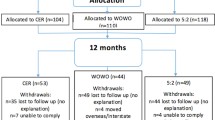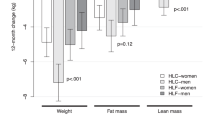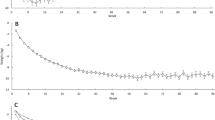Abstract
Background/objectives:
The primary aim of this secondary analysis was to compare changes in dietary intake among participants randomized to two versions of a 12-week commercial web-based weight loss program (basic or enhanced) with a waiting-list control. An additional investigation compared changes in dietary intake of successful participants (weight loss ⩾5%) with those not successful.
Subjects/methods:
Dietary intake was assessed at baseline and 12 weeks using a validated 120-item semiquantitative food frequency questionnaire. Adults (n=268, 60% female participants, body mass index 32.1±3.9) classified as plausible reporters of energy intake were included in the analyses. Analysis of covariance with baseline observations carried forward for drop-outs (n=38) was used.
Results:
The basic and enhanced groups significantly increased their percentage of energy contribution from fruits and reduced energy-dense, nutrient-poor foods compared with controls (P<0.001). Successful participants (n=49) reported superior improvements in dietary intake including greater reductions in the mean daily energy intake (P<0.001), the percentage of energy from energy-dense, nutrient-poor foods (−12.0% E vs −4.3% E, P<0.001) and greater increases in the energy contribution from fruits (P<0.001), vegetables (P=0.003) and breads/cereals (P=0.02).
Conclusions:
Use of a commercial web-based weight loss program facilitated some improvements in the dietary intake. The enhanced web-based tools appeared not to have generated greater improvements in reported dietary intake, compared with the basic or control groups. Those who achieved a weight loss of ⩾5% improved their dietary intake in line with the program recommendations and dietary guidelines. Further research to determine web-based components that may improve success and the reasons why programs are successful for some participants is required.
This is a preview of subscription content, access via your institution
Access options
Subscribe to this journal
Receive 12 print issues and online access
$259.00 per year
only $21.58 per issue
Buy this article
- Purchase on Springer Link
- Instant access to full article PDF
Prices may be subject to local taxes which are calculated during checkout
Similar content being viewed by others
References
Collins CE . Dietary strategies for successful weight loss and maintenance: more evidence required. J Am Diet Assoc 2011; 111: 1822–1825.
Levy RL, Finch EA, Crowell MD, Talley NJ, Jeffery RW . Behavioral intervention for the treatment of obesity: strategies and effectiveness data. Am J Gastroenterol 2007; 102: 2314–2321.
Miniwatts Marketing Group. World Internet Users 31st December 2011. 2011, Available from http://www.internetworldstats.com/stats.htm.
Kodama S, Saito K, Tanaka S, Horikawa C, Fujiwara K, Hirasawa R et al. Effect of web-based lifestyle modification on weight control: a meta-analysis. Int J Obes 2011; 36: 675–685.
Neve M, Morgan P, Jones P, Collins C . Effectiveness of web-based interventions in achieving weight loss and weight loss maintenance in overweight and obese adults: a systematic review with meta-analysis. Obes Rev 2010; 11: 306–321.
Gold BC, Burke S, Pintauro S, Buzzell P, Harvey-Berino J. . Weight loss on the web: a pilot study comparing a structured behavioural intervention to a commercial program. Obesity 2007; 15: 155–164.
Harvey-Berino J, Pintauro S, Buzzell P, DiGiulio M, Casey Gold B, Moldovan C et al. Does using the Internet facilitate the maintenance of weight loss? Int J Obes Relat Metab Disord 2002; 26: 1254–1260.
Harvey-Berino J, Pintauro S, Buzzell P, Gold EC . Effect of internet support on the long-term maintenance of weight loss. Obes Res 2004; 12: 320–329.
Harvey-Berino J, Pintauro SJ, Gold EC . The feasibility of using Internet support for the maintenance of weight loss. Behav Modif 2002; 26: 103–116.
Micco N, Gold B, Buzzell P, Leonard H, Pintauro S, Harvey-Berino J . Minimal in-person support as an adjunct to internet obesity treatment. Ann Behav Med 2007; 33: 49–56.
Polzien KM, Jakicic JM, Tate DF, Otto AD . The efficacy of a technology-based system in a short-term behavioural weight loss intervention. Obesity 2007; 15: 825–830.
Svetkey L, Stevens VJ, Brantley PJ, Appel LJ, Hollis JF, Loria CM et al. Comparison of strategies for sustaining weight loss: the weight loss maintenance randomized controlled trial. JAMA 2008; 299: 1139–1148.
Tate DF, Jackvony EH, Wing RR . Effects of Internet behavioural counselling on weight loss in adults at risk for type 2 diabetes: a randomised trial. JAMA 2003; 289: 1833–1836.
Tate DF, Jackvony EH, Wing RR . Arandomised trial comparing human e-mail counselling, computer-automated tailored counselling, and no counselling in an Internet weight loss program. Arch Intern Med 2006; 166: 1620–1625.
Tate DF, Wing RR, Winett RA . Using Internet technology to deliver a behavioural weight loss program. JAMA 2001; 285: 1172–1177.
Collins CE, Morgan PJ, Warren JM, Lubans DR, Callister R . Men participating in a weight-loss intervention are able to implement key dietary messages, but not those relating to vegetables or alcohol: the Self-Help, Exercise and Diet using Internet Technology (SHED-IT) study. Public Health Nutr 2011; 14: 168–175.
Patrick K, Calfas KJ, Norman GJ, Rosenberg D, Zabinski MF, Sallis JF et al. Outcomes of a 12-month web-based intervention for overweight and obese men. Ann Behav Med 2011; 42: 391–401.
Webber KH, Lee E . The diet quality of adult women participating in a behavioural weight-loss programme. J Hum Nutr Diet 2011; 24: 360–369.
Thomas P . Weghing the Options: Criteria for Evaluating Weight-Management Programs. National Academy Press: Washington, DC, USA, 1995.
Collins CE, Morgan PJ, Jones P, Fletcher K, Martin J, Aguiar EJ et al. Evaluation of a commercial web-based weight loss and weight loss maintenance program in overweight and obese adults: a randomised controlled trial. BMC Public Health 2010; 10: 669.
Collins CE, Morgan PJ, Jones P, Fletcher K, Martin J, Aguiar EJ et al. A 12-week commercial web-based weight-loss program for overweight and obese adults: randomized controlled trial comparing basic versus enhanced features. J Med Internet Res 2012; 14: e57.
Norton K Sports Medicine Australia pre-exercise screening system: Australian Department of Health and Ageing 2005, Available from http://sma.org.au/wp-content/uploads/2009/05/new_pre_screening.pdf.
Bandura A . Social foundations of thought and action: A Social Cognitive Theory. Prentice-Hall: Englewood Cliffs, NJ, USA, 1986.
Khaylis A, Yiaslas T, Bergstrom J, Gore-Felton C . A review of efficacious technology-based weight loss interventions: five key components. Telemedicine e-Health 2010; 16: 931–938.
Neve M, Morgan P, Collins C . Weight change in a commercial web-based weight loss program and its association with website use: a cohort study. J Med Internet Res 2011; 13: e83.
National Health and Medical Research Council. Nutrient Reference Values for Australia and New Zealand including Recommended Dietary Intakes. ACT: Department of Health and Aging: Canberra, 2006.
Collins CE, Watson JF, Guest M, Boggess MM, Duncanson K, Pezdirc K, Rollo M, Hatchesson MS, Burrows TL . Reproducibility and comparative validity of a food frequency questionnaire for adults. Accepted 26 September 2013 doi:10.1016/j.clnu.2013.09.015.
Kellet E, Smith A, Schmerlaib Y . The Australian Guide to Healthy Eating. The Department of Health and Aging: Canberra, 1998.
Black AE . Critical evaluation of energy intake using the Goldberg cut-off for energy intake:basal metabolic rate. A practical guide to its calculation, use and limitations. Int J Obes Relat Metab Disord 2000; 24: 1119–1130.
Schofield WN . Predicting basal metabolic rate, new standards and review of previous work. Human nutrition. Clin Nutr 1985; 39 (Suppl 1), 5–41.
Black AE, Cole TJ. . Biased over- or under-reporting is characteristic of individuals whether over time or by different assessment methods. J Am Diet Assoc 2001; 101: 70–80.
National Heart Foundation of Australia. Position statement: dietary fats and dietary sterols for cardiovascular health. National Heart Foundation of Australia, 2009.
Neve M, Morgan PJ, Jones PR, Collins CE . Effectiveness of web-based interventions in achieving weight loss and weight loss maintenance in overweight and obese adults: a systematic review with meta-analysis. Obes Rev 2010; 11: 306–321.
Glasgow RE . eHealth evaluation and dissemination research. Am J Prev Med 2007; 32: S119–S126.
Neve M, Collins C, Morgan P . Dropout nonusage attrition, and pretreatment predictors of nonusage attrition in a commercial web-based weight loss program. J Med Internet Res 2010; 12: e69.
Champagne CM, Broyles ST, Moran LD, Cash KC, Levy EJ, Lin PH et al. Dietary intakes associated with successful weight loss and maintenance during the weight loss maintenance trial. J Am Diet Assoc 2011; 111: 1826–1835.
Rutishauser IH . Dietary intake measurements. Public Health Nutr 2005; 8: 1100–1107.
Thompson FE, Subar AF . Dietary assessment methodology. In: Coulston A, Boushey C editors. Nutrition in the Prevention and Treatment of Disease 2nd edn. Elsevier Inc.: Burlington, MA, USA, 2008.
Acknowledgements
We would like to acknowledge the study subjects and research assistants (Julia Martin, Kate Fletcher, Elroy Aguiar, Ashlee Lucas, Rebecca Collins, Trevor Cripps, James Dower, Sharenjit Gill, Jenna Hannan, Skye Huxley, Hannah Mackay, Bryana Melnick, Justin Nicol, Hannah Lucas, Tom Mitchell, Huiru Teoh, Janine Wright and Mei Yap) who helped with data collection; Scott Penn, Anna Crook, Penelope Jones, Julian Barton, Sandra Mitchell and Laura Welsford from SP Health Pty Ltd. Michelle Palmer for reviewing the manuscript. This trial was funded by an Australian Research Council Linkage Project grant (2009–2012) (LP0990414, G0189752), with SP Health as the Industry Partner Organization (G0189753). CEC is supported by a National Health and Medical Research Council Australian Career Development.
Author information
Authors and Affiliations
Corresponding author
Ethics declarations
Competing interests
CEC has been a nutrition consultant to SP Health Co. MJH received a PhD scholarship supplement from SP Health Co. and Postdoctoral Research Fellowship from the Penn Foundation Australia. The remaining authors declare no potential conflict of interest.
Rights and permissions
About this article
Cite this article
Hutchesson, M., Collins, C., Morgan, P. et al. Changes to dietary intake during a 12-week commercial web-based weight loss program: a randomized controlled trial. Eur J Clin Nutr 68, 64–70 (2014). https://doi.org/10.1038/ejcn.2013.194
Received:
Revised:
Accepted:
Published:
Issue Date:
DOI: https://doi.org/10.1038/ejcn.2013.194
Keywords
This article is cited by
-
Remotely delivered and clinic-delivered lifestyle interventions produced similar effects on the diet quality of participants
Journal of Public Health (2024)
-
Obesity paradigm and web-based weight loss programs: an updated systematic review and meta-analysis of randomized controlled trials
Journal of Health, Population and Nutrition (2021)
-
Greater improvements in diet quality among overweight participants following a group-based commercial weight loss programme than those receiving support to lose weight in primary care
Nutrition Journal (2018)
-
Obesity Education Strategies for Cancer Prevention in Women’s Health
Current Obstetrics and Gynecology Reports (2015)



